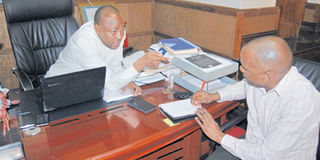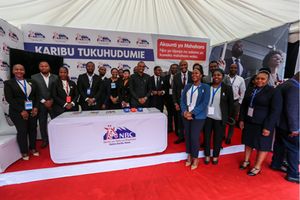We’re not here to frustrate govt: Dar mayor

Dar es Salaam City Council Lord Mayor Isaya Mwita (left) gestures during an interview with The Citizen reporter Louis Kolumbia recently.
What you need to know:
- In this interview, Political Platform reporter Louis Kolumbia talks to the man in charge of the Dar City Council, Mayor Isaya Mwita, to get the inside story on how the opposition is faring in managing the country’s de facto capital, largest—and, arguably, the most prominent — metropolis – during a period of widening political cracks between his party and the ruling CCM government:
Four of the five city-status metropolises in Tanzania are led by the opposition, with the biggest – Dar es Salaam – a Chadema stronghold.
In this interview, Political Platform reporter Louis Kolumbia talks to the man in charge of the Dar City Council, Mayor Isaya Mwita, to get the inside story on how the opposition is faring in managing the country’s de facto capital, largest—and, arguably, the most prominent — metropolis – during a period of widening political cracks between his party and the ruling CCM government:
QN:What challenges does the Dar es Salaam City Council (DCC) – currently led by the opposition Chadema – face in serving the country’s largest metropolis?
ANS: Although we meet with many challenges – including lack of sufficient experience and exposure – leading DCC is an opportunity for Chadema and the opposition in general. But I’ve spent enough time learning how to best serve the public – and I’m now ready to make the requisite developmental changes.
Following the government decision to shift the traditional sources of income – including property tax and service levy – from the local to the central government, the Ilala, Kinondoni and Temeke municipal councils have been hit hard financially.
The decision has reduced the municipal councils’ ability to collect revenues and adequately fund their budgets. DCC is currently providing Sh1.2 billion annually to each of the Councils – the first time that financial assistance has had to be extended to Councils by the City. We expect to increase the stipend after DCC reviews the issues at the end of the year.
Our aim is to enable the councils to implement development projects, such as building school classrooms, health centres and infrastructure, as well as rehabilitation existing facilities. Some of the councils do collect an average of Sh800 million-to-1 billion annually, and the amount we at DCC provide is a good incentive.
QN: President John Magufuli ‘stopped’ the eviction of petty traders operating in urban centres, generally on street pavements and in open parks/spaces, directing councils to relocate them to areas with developed infrastructure that supports their businesses. How have the Councils responded to that directive?
ANS: I shouldn’t respond to this question, as I don’t indulge in populist politics. I still have three years remaining (in my tenure as City Mayor) – and I want to focus on preparing my legacy that my people deserve.
QN: What difficulties do you have to contend with in fulfilling your official duties – especially considering that you are from the opposition working under the ‘ruling’ CCM government?
ANS: The answer to that question is well known to you – and to the rest of Tanzanians. It’s like a hapless orphan who needs to be provided with great care somehow.
Academicians have proposed three approaches in decision-making, namely: rational, economic and political. From the beginning, I opted for the ‘incremental approach,’ which calls for putting emphasis on issues that benefit the people.
I’m not supposed to moan; I’m supposed to deliver because I’m the ‘Lord Mayor in Office’ Therefore, I’m working hard to fulfill my people’s expectations – and leave behind a memorable legacy. There still remains a lot to be done.
QN: Could you please name at least three issues which you would like to be part of your legacy when you leaving public office?
ANS: My predecessors named a number of them – but they ended up failing to turn their dreams into reality. I’d like to differ with them in this; I will name the issues after I have accomplished them.
People would like to see the impact of my leadership on the ground, not mere politics. Politicking will spoil each and everything. I don’t want to disappoint my party, which has put great trust in me.
QN: What is your take on the arrests of politicians, including mayors and lawmakers – especially from the political opposition, mainly Chadema?
ANS: I’m not in a position to comment on that issue.
QN: O.K… What’s your take regarding the ban on public rallies and demonstrations – except for/by councillors and lawmakers in their respective wards and constituencies?
ANS: The ban is unhealthy for the country’s democracy. It was through rallies and demonstrations and sensitisation of the general public from the 2010 election to the 2015 polling that Tanzanians in general, and CCM in particular, considered Dr John Magufuli the right candidate to challenge opposition candidates in the 2015 presidential race.
President Magufuli and his government should know that the opposition is not out and out to disrupt its operations… Rather, the opposition is a ‘mirror’ that reflects the government, illuminatingly exposing its shortcomings so that it can get back on the right track.
As Tanzanians, we are all obliged to jointly promote national unity. We are all ‘one:’ all indigenous to this country; all our ancestors lived here. Therefore, the government should allow people to exercise their constitutional freedoms and rights – including holding public rallies and demonstrations, doing so within the statutory rules and procedures.
QN: Do you think the government made the right decision, banning live broadcasts of parliamentary proceedings in the National Assembly?
ANS: That is also unhealthy because live ‘Bunge’ (Parliament) broadcasts promote freedom of expression, and improve people’s efficiency in development activities for the country.
It was from live Bunge broadcasts that the nation learned of the various talents and leadership potentials that were inherent in people like Mr Kabwe Zitto, Mr Livingstone Lusinde, Ms Halima Mdee – and many other Tanzanians on both sides of the political aisle! Indeed, President Magufuli gained much of his current popularity during live broadcast sessions when, as a cabinet minister, he spewed out mounds of data from his memory in responding to questions in Parliament.
QN: What should opposition parties do to maintain – and even boost – their political impact in the face of the veteran ruling party CCM?
ANS: Opposition parties shouldn’t stop lamenting to God – the same way the Israelites did in Biblical times! It is through ‘continuous weeping’ that God will show us the way forward.
QN: According to President Magufuli, the new Constitution-making process is not a priority of the fifth-phase Government he leads. This is despite the immediate-past government of President Jakaya Kikwete (2005-15) having spent billions of shillings in taxpayer money on the initial processes. What’s your view on this?
ANS: President Magufuli should be in the right position to answer that question. This is because he is the one who decided to virtually abrogate the constitution review – doing so either on his own prerogative, or after taking advice from his closest aides.
In any case, my opinion is that a new Constitution is among the possible solutions that would enable the United Republic (of Tanzania) to move forward, in the right direction. You know: President Magufuli may have good intentions; but, who knows what will happen in the future? (The future is not ours to tell!)
QN: What word do you have for Dar es Salaam residents?
ANS: We are striving hard for their development in appreciation of the trust they put in us (Chadema) in the 2015 General Election. The people should maintain that confidence in their leaders – and I once again pledge that we won’t let them down.
QN: Lastly, what is your ‘life story,’ please…?
ANS: I’m from Tarime District, Mara Region, where I pursued my basic education, completed at Tarime Secondary School. Poor financial position denied me the opportunity to proceed with formal higher education – and I ended up in Dar es Salaam where I first worked as house-help, then as a peripatetic vendor selling bottled drinking water before turning to selling eggs.
However, striving hard, I just as soon joined Al Haramain Secondary School in the city where I successfully completed the Advanced Level education programme, later enrolling with the Mwalimu Nyerere Memorial University – also in the city – from which I graduated, awarded with a Bachelor’s Degree in Economics. Thereafter, I was employed by the Temeke Municipal Council as an economist. In due course, I started a printing company at Kariakoo. Meanwhile, I had developed political ambitions, which I nurtured until 2015 when I was elected councillor of the Vijibweni Ward on the Chadema party ticket.
It was the same Chadema ticket that enabled me to defeat by 84-to-67 votes the CCM candidate, Mr Yusuf Yenga – and became the country’s first Lord Mayor of Dar es Salaam City from the opposition since independence from colonial rule 56 years ago.




